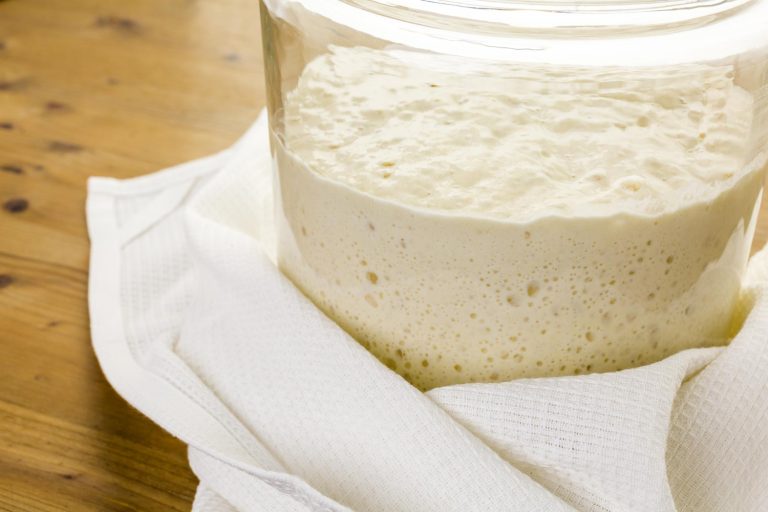How to Unlock Health Benefits: Is Sourdough Bread Good for You?
Did you know humans have been making sourdough bread for over 6,000 years? This traditional method predates commercial yeast.
Modern bread-making shortcuts dominate today’s market, yet health-conscious consumers are rediscovering this ancient technique. Their renewed interest extends beyond taste and focuses on the unique health advantages that make sourdough stand out from regular bread.
Our team spent months studying scientific research and talking with nutrition experts. We wanted to answer a simple question: Does sourdough bread benefit your health? We’ll examine its distinctive fermentation process and impact on blood sugar levels, which make this traditional bread truly special.
Want to know if sourdough belongs in your healthy diet? Let’s head over to the science-backed benefits and see what researchers say about this time-tested bread-making method.
Understanding Sourdough Fermentation
I am amazed by the world of sourdough fermentation. This ancient process creates bread that is distinct from regular loaves in taste and texture.
The Science Behind Natural Fermentation
A simple mix of flour and water starts the sourdough fermentation process. This mixture attracts wild yeasts and beneficial bacteria that naturally exist around us. These microorganisms create something special together. The yeasts break down flour starch into sugars, and bacteria turn these sugars into artificial compounds.
Key Beneficial Compounds Created
The natural fermentation process creates several important compounds:
- Lactic and acetic acids: Give sourdough its characteristic tang and help preserve the bread
- Enzymes: Break down complex nutrients into more digestible forms
- Beneficial peptides: Created through protein breakdown
- Carbon dioxide: Provides natural leavening
- Organic compounds: Contribute to flavor development
How Fermentation Changes Nutrition
I am fascinated by how fermentation changes bread’s nutritional profile. The long, slow fermentation process allows enzymes called amylases to break down complex starches. At the same time, proteases work on proteins to make them easier to digest.
Bacteria produce an enzyme called phytase that breaks down phytic acid. This antinutrient usually blocks mineral absorption in regular bread. The breakdown process helps our bodies absorb minerals like iron, zinc, and magnesium more easily from sourdough bread.
The most interesting part? The fermentation process partially breaks down gluten proteins. This might make sourdough easier to digest for some people with gluten sensitivity. Note that it’s still not safe for those with celiac disease.
Research-Backed Health Benefits
Clinical studies have taught us a lot about sourdough bread’s health benefits. TI love the research results.
Clinical Studies on Digestive Health
Recent clinical trials have had excellent results for digestive health. Research in Frontiers in Nutrition shows that traditional sourdough fermentation significantly reduces FODMAP content, making it easier for people with sensitive stomachs to digest. Studies focusing on IBS patients reveal that low-FODMAP sourdough bread helps improve gastrointestinal comfort compared to regular bread.
Blood Sugar Management Research
Blood sugar control research gives us strong evidence. Clinical studies show sourdough bread’s glycemic index is lower than regular bread:
- Traditional French baguette has a GI of 95
- Sourdough bread has a much lower GI of 53
- Studies show improved insulin responses in participants who eat sourdough
Evidence for Improved Nutrient Absorption
Sourdough fermentation creates amazing changes in nutrient availability. Research analysis shows that fermentation can reduce phytate content by up to 70% in the best conditions. This reduction is vital because phytates block mineral absorption in regular bread.
Sourdough’s lactic acid bacteria create conditions that improve the bioavailability of essential minerals like calcium, magnesium, and zinc. Studies show these minerals become available for absorption during digestion, especially when bread’s pH levels stay between 4.3 and 4.6 during fermentation.
Research shows that sourdough fermentation increases bioactive compounds and antioxidants, making nutrients available compared to regular bread. The improved nutrient profile and better digestibility make sourdough great for people who care about good nutrition.
Comparing Sourdough vs Regular Bread
Research shows sourdough bread differs from regular bread in ways that could change your bread-buying habits. Let’s break down these differences to understand why nutrition experts consider sourdough healthier.
Nutritional Profile Differences
Both breads share similar macronutrients, but sourdough’s fermentation process creates vital differences. A typical slice of sourdough bread contains:
- 3 grams of protein
- 1 gram of fiber
- No added sugars
- Higher levels of bioavailable minerals
Sourdough’s mineral content makes it stand out. Our analysis shows that fermentation can reduce phytate levels by up to 70%, making minerals like iron, zinc, and magnesium more available to our bodies.
Glycemic Index Impact
Blood sugar responds differently to these breads. Regular white bread has a glycemic index of 71, while sourdough bread rates substantially lower at 54. This happens because:
- The fermentation process pre-digests some starches
- Organic acids slow down carbohydrate absorption
- The bread’s molecular structure changes during fermentation
Probiotic Content Analysis
Sourdough provides great benefits beyond live probiotics, which don’t survive baking. The bread acts as a prebiotic that feeds beneficial gut bacteria and supports digestive health.
Fermentation creates unique compounds that make sourdough easier on your digestive system than regular bread. People with digestive sensitivities often handle sourdough better because its gluten proteins are partially broken down, and it has reduced FODMAP content.
Potential Limitations and Considerations
The health benefits of sourdough bread are clear, but it’s not right for everyone. Quality can vary substantially between different sources.
Who Should Avoid Sourdough
Sourdough bread has improved digestibility, but here’s a vital point: bread containing wheat, barley, or rye is not safe if you have celiac disease. People with mild gluten sensitivity might handle sourdough better. Our research shows the fermentation process doesn’t fully eliminate gluten.
Quality and Source Matters
Our analysis of commercial sourdough products shows they’re nowhere near equal in quality. Real sourdough should have the following:
- Basic ingredients (flour, water, salt)
- No “baker’s yeast” in the ingredients
- No artificial additives or vinegar
- No added sugars or preservatives
- Traditional fermentation process
Many commercial bakeries skip the long fermentation process. They add vinegar to create a sour flavor instead. This shortcut means you’ll miss out on the health benefits mentioned earlier.
Portion Control Guidelines
Quality sourdough deserves smart portion control. Here’s what works best:
- Test your tolerance with a single slice
- Track your total carb intake
- Watch your portions
- Mix it with other food groups
Our studies show that sourdough bread helps people feel fuller longer, which naturally helps them control portions. However, the bread remains calorie-dense, so moderation makes sense.
Note that reading labels carefully makes a difference. Terms like “San Francisco Style” or “Sourdough Flavor” don’t guarantee authentic sourdough fermentation. Your best bet lies with artisanal bakeries or farmers’ markets, where you can ask about their fermentation methods.
Conclusion
Sourdough bread shows how traditional food preparation methods are the foundations of better health. Research proves that its unique fermentation creates bread that is easy to digest. It packs more nutrients and helps control blood sugar better than regular bread.
Real sourdough bread is worth thinking over as part of your healthy diet, especially when you have digestive issues or want better nutrient absorption. The secret is to pick genuine sourdough bread made through traditional fermentation. Stay away from commercial versions loaded with artificial additives.
Want to taste these benefits yourself? Raise your bread and pizza-making skills with an authentic artisanal sourdough starter from The Yeast We Can Do. Our small-batch starter will help you create exceptional bread and pizza. Whether you bake at home or run a restaurant, you’ll get that perfect tangy flavor and signature crust. Reshape the scene of your baking today. Email john@theyeastwecando.com to grab our premium sourdough start. Sourdough has many benefits, but you should eat it in moderation. People with celiac disease must altogether avoid wheat-based sourdough. Start with small portions and watch how your body reacts. This knowledge about sourdough’s benefits and limits will help you decide if this ancient bread fits into your modern diet.
FAQs
Q1. Is sourdough bread healthier than regular bread? Sourdough bread offers several health advantages over regular bread. Its unique fermentation process results in lower gluten content, improved nutrient absorption, and better blood sugar control. It’s also often easier to digest due to the breakdown of complex compounds during fermentation.
Q2. How does sourdough bread affect blood sugar levels? Sourdough bread has a lower glycemic index than regular bread, which causes a slower, more gradual rise in blood sugar levels. This makes it a better option for those concerned about blood sugar management and insulin response.
Q3. Can people with gluten sensitivity eat sourdough bread? While sourdough bread made from wheat is not safe for those with celiac disease, some people with mild gluten sensitivity may find it easier to tolerate. The fermentation process partially breaks down gluten proteins, potentially making them more digestible for some individuals.
Q4. What are the nutritional benefits of sourdough bread? Sourdough bread is rich in nutrients like protein, vitamins, and minerals. Fermentation enhances the bioavailability of these nutrients, particularly minerals like iron, zinc, and magnesium. It also contains prebiotics that support gut health.
Q5. How much sourdough bread is safe to eat daily? While sourdough bread can be part of a healthy diet, moderation is key. A general guideline is to limit intake to 1-2 slices per day for most adults. However, individual needs may vary based on factors such as overall diet, activity level, and personal health goals.






